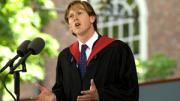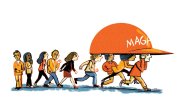Richard Lawrence Robert Crowder, M.P.A. ’07 Kennedy School of Government, delivers the Graduate English Oration titled "Ghosts in the Yard" for Harvard's 356th Commencement Exercises.
(Speech as prepared)
Some of you may have entered Harvard Yard today through the Meyer Gate, over to my right, which leads across to the Science Centre and Memorial Hall. There is a plaque there, with a quotation from Ralph Waldo Emerson describing a Harvard Jubilee in 1836. One sentence in particular has always struck me: "Cambridge at any time is full of ghosts, but on that day... a far longer train of ghosts followed the Company - the long unwinding train reaching back into eternity."
Ghosts in the Yard. Perhaps it is a morbid idea on this day of celebration. But today, we are all here with our ghosts: people who were instrumental in bringing us to Harvard; people who have guided us in our lives; people who we wish could be with us, but cannot.
Let me introduce you to a couple of my ghosts. As I stand here, I think of my two grandfathers - Lawrence Crowder, and Robert Styles. Lawrence was English, Robert Irish. Both fought in the First World War: Lawrence in the trenches outside Ypres, Robert in the dust of Palestine. We still have a wrinkled photograph of Robert standing in the Garden of Gethsemane after British forces entered Jerusalem in November 1917. I didn't know either of them personally, but I carry their names in my own, and those images, along with fragments of family stories, have followed me through my life.
Others of you will also have ghosts touched by war, and many far more recently so than in my case. After all, such horrors are never far away. Indeed, the last time that I was in such a large crowd was in July 2005, when, along with thousands of others across the United Kingdom, I stood in silent defiance of the British-born bombers who had just added London to the list of cities scorched by terrorism. I did so that day in Whitehall - outside the British Foreign Office, where I was working - and opposite the Cenotaph, which was erected in 1920 to commemorate the dead of the First World War. My ghosts felt very close to me on that silent morning in the sunshine.
How can we respond to their call? Harvard has shown me how varied and powerful those calls can be. I think of one classmate from Chile, inspired by the murder of his uncle during the Pinochet era to establish a charity addressing child poverty, or another from Korea, whose grandparents had fled the north, and led him to create an organization helping political refugees. I feel humbled by such noble achievement at a young age. Harvard hasn't made me feel any more intelligent, and indeed there have been many moments during this year when I felt less so. But there is a sense of possibility which pervades this place, and which can make us each rise to the call of our ghosts.
For me, that vocation is the work of a diplomat. I leave here for Brussels, to serve on the staff of Javier Solana, who represents the European Union's collective foreign policy. As it happens, I will be working just a few miles from Ypres, where my grandfather fought. When I contemplate the job ahead of me, I realize Harvard has taught me that listening will be the hardest part. It is all too easy to react to what others are saying with our own views. But finding the space in which to digest, and moving to a response which heals rather than perpetuates conflict, is a much harder task. It forces us to accept that there is no monopoly on the truth.
Let me give you just one example. Sixty years ago, at this very ceremony, one of America's greatest diplomats - George Marshall - launched the aid plan which would carry his name. In a masterful statement of soft power, matching the hard power of NATO that would emerge two years later, he pledged to use American money to enable the countries of Europe to rebuild after the Second World War. But he did not seek to tell the Europeans how to spend that money: the program obliged them to come up with their own ideas. And the Eastern Bloc countries were invited to participate too. Marshall wanted all sides to listen and collaborate. We can only speculate what ghosts stood behind him, a veteran of almost fifty years' military service, as he gave that speech.
Listening; understanding; inviting others to share in the work before us. In Europe, we have taken a long time to learn these lessons - and we're not there yet. I wonder if, in this new century of uncertainty and opportunity, the world will build on that experience, rather than learning it all over again. You, my classmates, have given me hope. Our time here has challenged us to have courage and do those things which would give our lives meaning, which would lay our ghosts to rest, and continue the best of their work. Let that challenge follow us as we leave here today. For, after all, our ghosts will be watching us.






